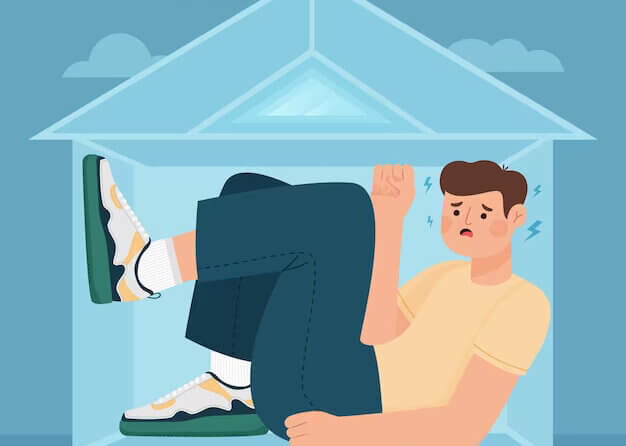
One needs social connections in order to thrive and survive.
Living alone as an older person may make them more vulnerable to social isolation and loneliness, both of which can be harmful to their health. According to studies, social isolation and loneliness raise the chance of developing conditions like heart disease, depression, and cognitive decline.
It’s possible that being socially isolated or lonely is more likely if you’re not feeling well. Your physical and emotional health may be at danger if you’re feeling lonely or socially isolated. Compared to those with supportive and meaningful social relationships, individuals who are lonely or socially isolated are less healthy, have longer hospital stays, are readmitted to the hospital more frequently, and are more likely to die earlier.
We frequently bring up loneliness while talking about how to deal with social isolation.
Those who experience loneliness feel cut off from their surroundings and lack close friends and confidants.
On the other hand, social isolation occurs when a person has little to no social interaction. They might not have the opportunities even if they wished to interact socially.
Calling a friend and going out for coffee can help you feel less lonely, but social isolation may last longer than one fruitful encounter. Because there aren’t enough individuals to turn to, many find it difficult to get their problems resolved.
Fortunately, neither endures forever. It is always feasible to combat loneliness or prevent social isolation.
Reduction of social isolation and loneliness among the elderly
Social isolation and loneliness are important, but social determinants of health for all age groups, including older adults, are often neglected. Quality social connections are critical to our mental and physical health. and essential to well-being. Social isolation and loneliness are prevalent, with up to a third of older people reported feeling lonely in some countries. Numerous studies have shown that social isolation and loneliness severely impact the lifespan, physical and mental health, and quality of life of older people. We compared the effects of social isolation and loneliness on mortality with other well-established mortality risk factors such as smoking, obesity and physical inactivity. Various face-to-face or digital interventions have been developed to reduce social isolation and loneliness in older adults.
Although social isolation is reversible, some of its effects have a negative impact on your health. Read the following to learn about the five effects of social isolation:
- Our immune system and mental health are compromised by emotional anguish.
- Greater likelihood of dementia and Alzheimer’s illness
- Concerns with substance misuse and addiction
- Heart disease and excessive blood pressure are examples of poor physical health.
- Poor sleep patterns
Social isolation occurs in people for a variety of causes. A crucial distinction to make is between someone who lives alone and does not experience social isolation or loneliness and someone who lives with five roommates but still feels lonely.
Keep in mind that everyone is dealing with something different since how it affects you may not affect someone else the same way.
Here are four reasons that could increase your risk of social isolation:
1. Mental Health Issues
Although social isolation can contribute to sadness and anxiety, the relationship can also work the other way.
Depression-related poor self-esteem or lack of confidence can cause people to feel as though engaging with others is a bad idea, leading them to withdraw or avoid establishing or maintaining social relationships.
2. Stress
Sometimes, when juggling multiple obligations, a person has little time left to prioritize their social health. It can be easy to withdraw from the extras when stress levels rise, such as trying to spend time with friends. For a brief amount of time, such as during a busy work week or finals week in college, this is natural and healthy. However, if it persists for a while, stress can lead to protracted social isolation. Making time to unwind and unwind at these times is crucial. Although you may not feel like you have the time, it is essential for long-term fitness.
3. Social anxiety and introversion
Some people, particularly introverts, actually relish their alone time. Social anxiety is sometimes, but not always, accompanied by this. Even if they believe that spending most of their time alone makes them happy, these variables can cause someone to do so. Even if it can be more uncomfortable than being alone for socially isolated persons, social interaction and building connections are crucial for social health in the long term.
4. Loss of loved ones
Our emotions are greatly affected when we lose the ones we love.
We may become socially and otherwise isolated as a result of the grieving process.
We become hesitant to establish new friendships because we miss the ones we’ve lost. We may withdraw from social situations following a breakup in a relationship or friendship because we feel exposed and don’t want to get wounded again.
We may practice avoiding circumstances that might cause someone to suffer social isolation, even how terrifying the consequences might appear. Here are six ideas to help everyone avoid and overcome social isolation:
- Make time for self-care and activities that fill you with meaning away from work.
- Join social organizations such as a book club or a sports team.
- When spending time with friends and family, make plans in advance so that you have something to look forward to.
- Take on a pet as a companion.
- Spend time assisting others as a volunteer
- Maximize your use of phone and video calls.
- Consider joining a support group or contacting a therapist for medical advice.
Although social isolation might seem like something you have to deal with on your own, this is not the case.
Individuals close to you will become aware of your need for assistance if you speak up for yourself and share your feelings of loneliness with them. And seeking assistance is never a bad thing.
To empower yourself to leave your solitude, you might start by taking the initiative to seek for assistance.
If you are looking for Online counselling in India contact TalktoAngel, a platform that connects the best online therapists with online counsellor
Also Read: How to Get Motivated and Help Ourselves?






